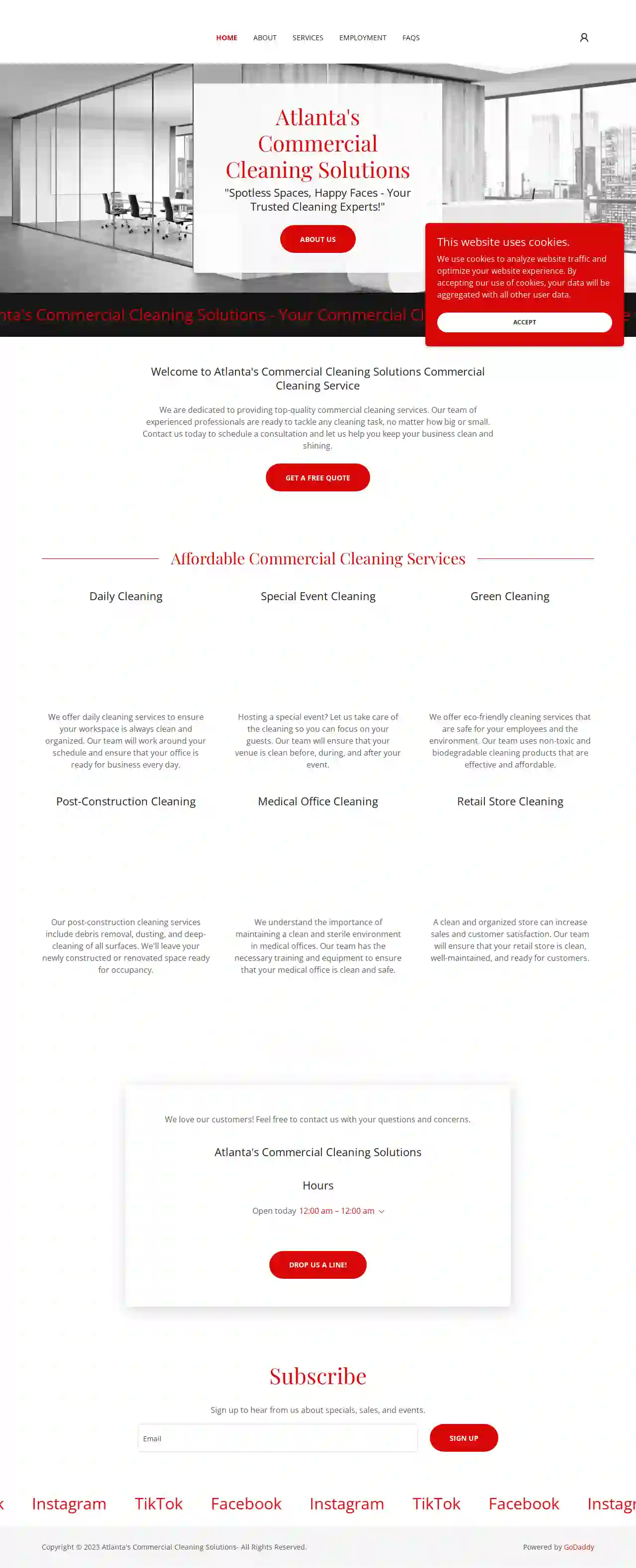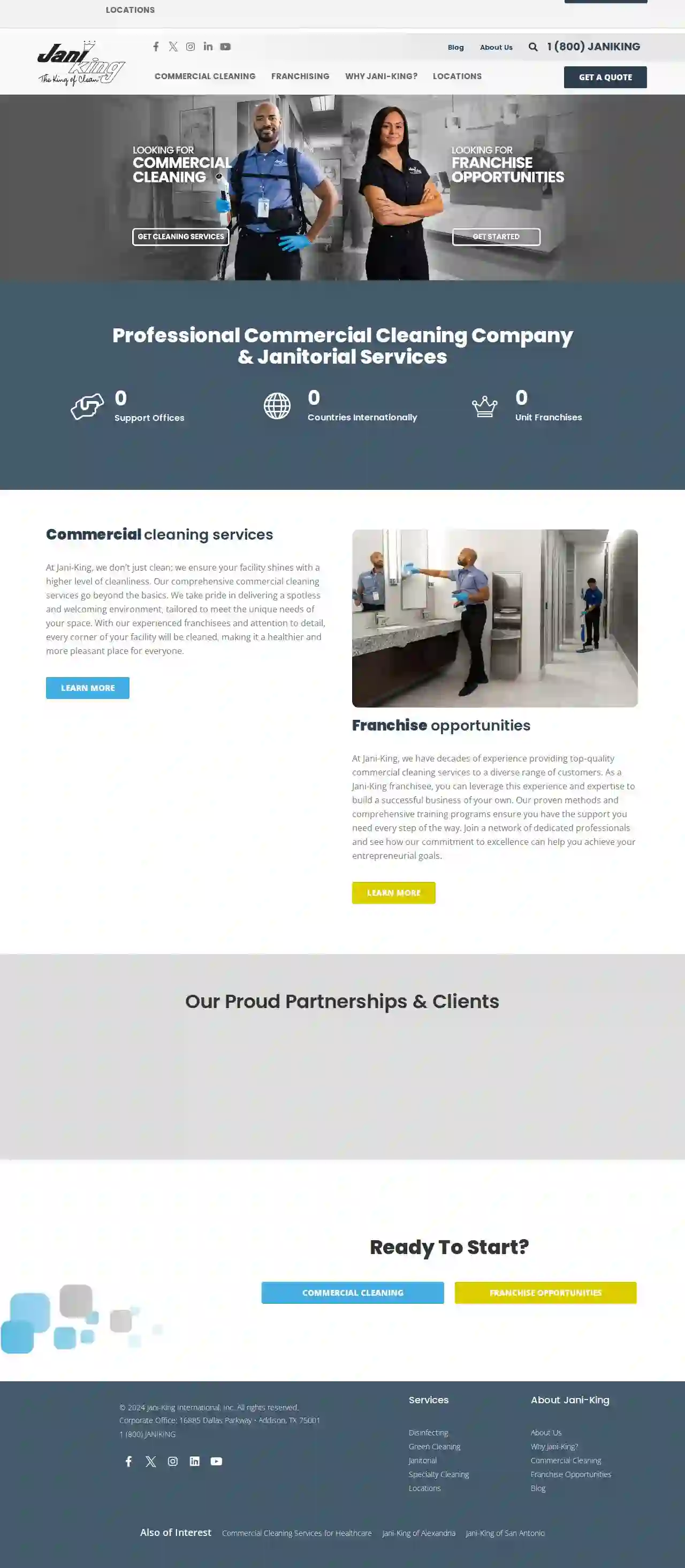Commercial Cleaning Waynesboro
Find top Business Cleaning in Waynesboro
Get multiple Office Cleaning Contractors quotes for your project today! Compare profiles, reviews, accreditations, portfolio, etc... and choose the best service.
Service Needed
City or Town
- Pr
Pristine Clean Gainesville Cleaning Service
3.320 reviewsGainesville, US- Services
- Why Us?
Get Quote - Ge
Georgia Hatters & Cleaners
4.211 reviewsAugusta, US- Services
- Why Us?
Get Quote 
Anago of Greater Columbus
3.312 reviewsColumbus, US- Services
- Why Us?
Get Quote- GA
GA Janitorial Supply & Services
4.97 reviewsAtlanta, US- Services
- Why Us?
Get Quote 
Atlanta's Commercial Cleaning Solutions Llc
51 reviewsAtlanta, US- Services
- Why Us?
Get Quote- Ur
Ur Way Cleaning Services LLC
58 reviewsColumbus, US- Services
- Why Us?
Get Quote 
Maid For Homes: House Cleaners of Columbus
4.769 reviewsColumbus, US- Services
- Why Us?
Get Quote
Heaven Cleaning
511 reviewsAtlanta, US- Services
- Why Us?
Get Quote
Jani-King International, Inc
3.414 reviewsColumbus, US- Services
- Why Us?
Get Quote
The Cleaning Authority - Augusta
4.7182 reviewsAugusta, US- Services
- Why Us?
Get Quote
Over 60,241+ Janitorial Contractors onboarded
Our cleaning service providers operate in Waynesboro & surrounding areas!
CleaningMatch has curated and vetted the Best Janitorial Contractors near Waynesboro. Find a top & trustworthy pro today.
Frequently Asked Questions About Commercial Cleaning
We understand that finding the right commercial cleaning service can be challenging. To help you make informed decisions, we've compiled answers to frequently asked questions about commercial cleaning and hiring cleaning professionals in the USA.
- Experience: 'How long have you been providing commercial cleaning services?'
- Licensing and insurance: 'Are you licensed and insured? Can I see proof of coverage?'
- Cleaning methods: 'What cleaning methods and products do you use?'
- Employee training: 'Are your employees trained and screened?'
- References: 'Can you provide references from previous clients?'
- Security: 'What security measures do you have in place?'
- Damage policy: 'What happens if something is damaged during cleaning?'
- Specialization: 'Do you have experience cleaning businesses like mine?'
- Focuses on businesses and commercial properties (offices, retail stores, etc.).
- Typically involves larger spaces requiring specialized equipment.
- Often follows specific cleaning protocols and safety regulations.
- May involve specialized cleaning for specific industries (e.g., medical facilities).
- Geared towards private homes and apartments.
- Usually involves smaller spaces and may not require specialized equipment.
- More focused on personalized cleaning plans and homeowner preferences.
- Healthier work environment: Professional cleaning reduces germs and allergens, promoting employee well-being.
- Improved employee morale: A clean and organized workspace can boost productivity and job satisfaction.
- Enhanced business image: A spotless office makes a positive impression on clients and visitors.
- Time savings: Focus on your core business activities while professionals handle cleaning.
- Increased productivity: Employees in a clean environment are often more efficient.
- Reduced sick days: A healthier workspace can contribute to lower absenteeism.
- Compliance with regulations: Professional cleaners ensure your facility meets hygiene standards.
- Written notice: A formal written notice of cancellation is usually required.
- Notice period: Contracts often specify a notice period (e.g., 30 days) before cancellation takes effect.
- Cancellation fees: Some contracts may stipulate fees for early termination.
What questions should I ask potential commercial cleaning services?
Before hiring a commercial cleaning company, gather information to ensure they meet your requirements:
How does commercial cleaning differ from residential cleaning?
While both aim for cleanliness, commercial and residential cleaning have key differences:
Commercial Cleaning:
Commercial Cleaning:
What are the advantages of using a professional cleaning service?
Outsourcing your commercial cleaning offers several significant benefits:
What's the process for canceling a commercial cleaning contract?
Cancellation procedures are typically outlined in the termination clause of your cleaning contract. Common requirements include:
What questions should I ask potential commercial cleaning services?
Before hiring a commercial cleaning company, gather information to ensure they meet your requirements:
- Experience: 'How long have you been providing commercial cleaning services?'
- Licensing and insurance: 'Are you licensed and insured? Can I see proof of coverage?'
- Cleaning methods: 'What cleaning methods and products do you use?'
- Employee training: 'Are your employees trained and screened?'
- References: 'Can you provide references from previous clients?'
- Security: 'What security measures do you have in place?'
- Damage policy: 'What happens if something is damaged during cleaning?'
- Specialization: 'Do you have experience cleaning businesses like mine?'
How does commercial cleaning differ from residential cleaning?
While both aim for cleanliness, commercial and residential cleaning have key differences:
Commercial Cleaning:
Commercial Cleaning:
- Focuses on businesses and commercial properties (offices, retail stores, etc.).
- Typically involves larger spaces requiring specialized equipment.
- Often follows specific cleaning protocols and safety regulations.
- May involve specialized cleaning for specific industries (e.g., medical facilities).
- Geared towards private homes and apartments.
- Usually involves smaller spaces and may not require specialized equipment.
- More focused on personalized cleaning plans and homeowner preferences.
What are the advantages of using a professional cleaning service?
Outsourcing your commercial cleaning offers several significant benefits:
- Healthier work environment: Professional cleaning reduces germs and allergens, promoting employee well-being.
- Improved employee morale: A clean and organized workspace can boost productivity and job satisfaction.
- Enhanced business image: A spotless office makes a positive impression on clients and visitors.
- Time savings: Focus on your core business activities while professionals handle cleaning.
- Increased productivity: Employees in a clean environment are often more efficient.
- Reduced sick days: A healthier workspace can contribute to lower absenteeism.
- Compliance with regulations: Professional cleaners ensure your facility meets hygiene standards.
What's the process for canceling a commercial cleaning contract?
Cancellation procedures are typically outlined in the termination clause of your cleaning contract. Common requirements include:
- Written notice: A formal written notice of cancellation is usually required.
- Notice period: Contracts often specify a notice period (e.g., 30 days) before cancellation takes effect.
- Cancellation fees: Some contracts may stipulate fees for early termination.